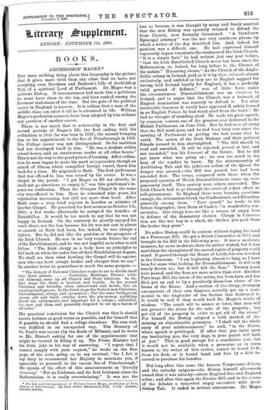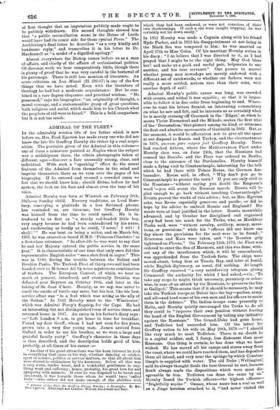BOOKS.
ARCHBISHOP MAGEE.* THE most striking thing about this biography is the picture that it gives, more vivid than any other that we have, not excepting even Davidson and Benham's Life of Archbishop Tait, of a spiritual Lord of Parliament. Dr. Magee was a militant Bishop. If circumstances had made him a politician he must have risen to the top, and been ranked among the foremost statesmen of the time. But the gate of the political career in England is narrow. It is seldom that a man of the middle class can enter it till he is advanced in life. William Magee's profession seems to have been adopted by him without - any question of another career.
There is not much that is noteworthy in the first and second periods of Magee's life, the first ending with his ordination in 1844 (he was born in 1821). the second bringing him to his appointment to the See of Peterborough in 1868.
His College career was not distinguished. So far ambition had not developed itself in him. "He was a student within school-hours, and an omnivorous reader at all other hours."
This is not the way to the great prizes of learning. After ordina- tion he soon began to make his mark as a preacher, though an attack of illness, which compelled foreign travel, threw him back for a time. He migrated to Bath. The first preferment that was offered to him was vetoed by his rector. It was a chapel in the parish. "I got Magee to fill my church ; he shall not go elsewhere to empty it," was this gentleman's in- genuous confession. Then the Octagon Chapel in the same city was offered to him. Here he remained nine years, his reputation increasing, but still not more than local. After Bath came a very brief sojourn in London as minister of Quebec Chapel. He preached his first sermon on October 7th, 1860; a few weeks afterwards he accepted the benefice of Enniskillen. It would be too much to say that he was not happy in Ireland. On the contrary, he greatly enjoyed his work there, not the less because his lot was not cast in places so smooth as Bath had been, for, indeed, he was always a fighter. But he did not like the position or the prospects of the Irish Church. He saw in no very remote future the end of the Establishment, and he was not hopeful as to what would follow. "The Irish clergy as a body have no principles to fall back on when the outer line of their Establishment is gone. We shall see then what bowling the Gospel will do against men who can howl always louder and cheaper than we can."
In another letter he generalises to much the same purpose :—
" The history of National Churches seems to me to divide itself into three phases Courtship, Marriage, Divorce with- out Alimony, sums up all Church and State relations. In the first stage the State is heathen and hostile. In the second Christian and friendly, often subservient and lavish, like an uxorious bridegroom. In the third stage the State is non-Christian, latitudinarian, stingy, and tyrannical ; like the same bridegroom grown old and hard, cutting down the pin-money, quibbling about the settlements, and impatient for a release ; unfaithful, too, now and then, and generally disposed to set up a harem of all sorts."
His practical conclusion for the Church was that it should secure betimes as good terms as possible, and for himself that if possible he should find a refuge elsewhere. His own wish was fulfilled in an unexpected way. The Deanery of St. Paul's was vacant (by the death of Milman), and he wrote to Mr. Disraeli asking for one of the appointments that might be vacated in filling it up. The Prime Minister had his little joke in his way of answering. "I regret that I cannot comply with your request," he wrote on the first page of his note, going on to say overleaf, "for I felt it my duty to recommend her Majesty to nominate you, if agreeable to yourself, to the vacant See of Peterborough." He speaks of the effect of this announcement as literally stunning.' "For an Irishman, and the first Irishman since the Reformation, it is really overwhelming." It was not the • The Life and Correspondence of William Connor Magee. Archbishop of York, Bishop of Peterborough. By John Cotter Meedonnell, D.D. 2 vols. London; Ithister and Co.
less so because it was thought by many and freely asserted that the new Bishop was specially retained to defend the
Irish Church, now formally threatened. "A brand-new Episcopal attorney" was the not very courteous phrase by which a writer of the day described him. And, indeed, his position was a difficult one. He had expressed himself vigorously inpast times:as to the weakness of the Irish Church. "It is a simple fact," he had written just one year before, "that the Irish Established Church never has been since the Reformation, or, indeed, for long before it, the Church of the nation." His saving clause, " As the Church of the Anglo- Celtic colony in Ireland, paid as it is by these colonists almost exclusively, and entitled as they are to English support for having held Ireland loyally for England, it has a perfectly valid ground of defence," was of little force under the circumstances. Disestablishment was an eirenicon to Ireland, and to argue that the Church was a bulwark of English domination was scarcely to defend it. Yet what intolerable baseness it would have appeared if, safely housed in. an English Palace, he had stood aloof from the battle ! He had no thought of standing aloof. He made his great speech, by common consent one of the greatest ever delivered in the British Parliament, on June 15th. But he had seen all along that the Bill must pass, and he had been busy ever since the meeting of Parliament in getting the best terms that be could. The action of the Irish Bishops and their political friends seemed to him shortsighted. " The Bill should be read and amended. It will be rejected, passed at last, and not amended," was his forecast of the future. But he did not know what was going on ; he was too much in the heat of the conflict to know. By the statesmanship of Archbishop Tait and the judicious action of the Queen the danger was averted,—the Bill was passed, but bad been amended first. The terms, compared with those when the proposed question of Welsh Diseetablishment came up, were generosity itself. This anxiety over, others succeeded. The Irish Church had to go through the crisis of a first effort at self-government. In England there were burning questions enough, the Athanasian Creed, the Confessional, and Ritualism generally among them. "Your synod," he wrote to his future biographer, then Dean of Cashel, "is wonderfully con- servative. Our clergy here are like a swarm of angry bees in defence of the damnatory clauses. Clergy in Convoca- tion are like wet hay in a stack, the thicker you pack them the hotter they grow."
No active Bishop could be content without trying his hand on a Patronage Bill. He got a Select Committee in 1874, and brought in his Bill in the following year. It was a moderate measure, far more moderate than its author wished, but it was more than the champions of the sacred rights of property could stand. It passed through the House of Lords, but was wrecked in the Commons. "I am beginning almost to long, as I have been for some time looking, for Diseetabliehment. It will very nearly drown us ; but it will kill the fleas." Twenty years have passed, and the fleas are more active than ever. Another Patronage Bill, the latest of the series, has been born and has died, put an end to by a peculiarly shameless abuse of the forms of the House. And a section of the clergy, strangely unconscious of their own disgrace, actually got up a testi- monial to the ringleader of the faction that destroyed it. It would be well if they would heed Dr. Magee's words of wisdom. "The result will be sooner or later, that men will not preserve the abuse for the sake of the property ; but get rid of the property in order to get rid of the abuse." For himself the Bishop adopted a bold method of dis- missing an objectionable presentee. "I shall tell the whole story of your misdemeanours," he said, "in the House, where speech is privileged. If after that you insist upon my instituting you, the very dogs in your parish will bark at you." This is good enough for a scandalous case, but it would not be available when a presentee, as in cases known to the writer of this review, cannot be heard 10 ft. from his desk, or is bound hand and foot by a debt in- curred to purchase his benefice.
Not long after this came the famous Temperance debate, and the unlucky epigram—the Bishop himself afterwards owned that it was unlucky—about England free and England sober; and after this again the Burials Bill, and in the course of the debates a somewhqt angry encounter with Arch- bishop Tait. It ended in mutual concessions. Dr. Magee
at first thought that an imputation publicly made ought to be publicly withdrawn. His second thoughts showed him that "a public reconciliation scene in the House of Lords would have had its comic side for those cynical Peers." The Archbishop's final letter he describes "as a very kindly and handsome reply," and transcribes it in his letter to Dr. Macdonnell as "a model of a dignified apology."
Almost everywhere the Bishop comes before us as a man of affairs, and chiefly of the affairs of ecclesiastical politics. Of diocesan work we hear comparatively little, though there is plenty of proof that he was very careful in the bestowal of his patronage. There is still less mention of literature. An acute criticism on Lux Mundi (II. 286-87) is one of the few things that we have noted. Even with the literature of theology he had but a moderate acquaintance. But he com- bined in a rare degree eloquence and practical wisdom. "He possessed," says his biographer, "an originality of thought, a moral courage, and a statesmanlike grasp of great questions, both religious and social, which made him to his Church what the prophets of old were to Israel." This is a bold comparison, but it is not too much.



















































 Previous page
Previous page